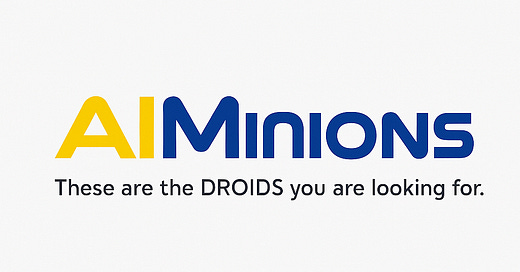AI Agents Updates - TL;DR - 11th May 2025
AI agents hit the mainstream this week: fresh funding, new no-code tools, and open standards are making it easier than ever for businesses to build, deploy, and connect powerful AI agents in real.
🕑 30-Second Snapshot
$40M+ in fresh funding for agent startups, new tools for building and deploying AI agents without code, and big tech pushing cross-platform collaboration standards. Enterprises are moving from pilots to real-world AI agent deployments, while new open-source and low-code platforms are making agent tech accessible to more teams.
📈 Momentum Meter
Funding: ▲ Relevance AI ($24M Series B), StackAI ($16M Series A)
Enterprise Pilots: ▲ IBM, Google, Microsoft roll out agent tools and standards for real-world use
Open-Source Launches: ▲ Zencoder’s Zen Agents platform debuts with open-source agent catalog
Policy / Ethics: ▲ Microsoft and Google push for open agent collaboration standards (A2A protocol)
🚀 Rapid Round-Up
Relevance AI × Raises $24M to expand agent OS × More teams can build custom agents, not just engineers.
StackAI × Lands $16M for no-code agent platform × Even non-tech companies can automate workflows.
Zencoder × Launches Zen Agents for coding tasks × Devs get open-source agents for code automation.
IBM × Debuts watsonx Orchestrate with 150+ prebuilt agents × Faster enterprise agent adoption, less custom code.
Microsoft × Adopts A2A protocol for agent interoperability × Agents from different vendors can finally talk to each other.
Refact.ai × Ships autonomous coding agents for IDEs × Promises 40% faster feature delivery for dev teams.
TufinMate × Unveils security agent for network troubleshooting × Engineers can fix issues using plain chat in Slack/Teams.
🔍 Deep Dives
Funding & Market Moves
Relevance AI secured $24 million in Series B funding to grow its AI agent operating system, which lets both engineers and business experts build specialized agents for their organizations. The new capital will accelerate development of visual tools for designing multi-agent workflows and a text-to-agent generator, making it easier for non-technical users to create agents in minutes. This signals strong investor belief in democratizing AI agent creation and scaling their use in real businesses.
Meanwhile, StackAI raised $16 million in Series A funding for its no-code platform that enables companies-even those with little tech experience-to build AI agents for automating business operations. StackAI’s traction with sectors like construction and local government highlights how agentic AI is moving beyond tech giants to transform everyday industries.
Shipped Capabilities
IBM launched watsonx Orchestrate, a platform boasting 150+ prebuilt agents and 80+ enterprise app integrations, claiming it can build useful agents in under five minutes. This approach tackles the “infrastructure mess” that slows down AI adoption and aims to help the 75% of AI projects that currently miss ROI targets. The focus: plug-and-play agents that fit into existing enterprise workflows, not just tech demos.
New Use-Cases & Case Studies
Security and developer productivity are front and center: TufinMate’s new agent lets network engineers troubleshoot and manage configs directly via Slack or Teams chats, making complex IT work as simple as texting a friend. Refact.ai’s autonomous coding agents now handle full-stack feature implementation inside IDEs, promising 40% faster production readiness-meaning dev teams can ship features faster, with less manual coding.
Tooling & Infra Arms-Race
Zencoder’s Zen Agents platform launched with a catalog of open-source agents for automating programming tasks and a tool for building custom agents using plain English prompts. The platform supports integration with third-party tools via Anthropic’s MCP protocol, making it easier for teams to connect agents to their existing workflows securely. This arms-race in open, composable agent tooling is lowering the barrier for companies of all sizes to experiment with and adopt agent tech.
💡 Startup to Watch
StackAI is making waves with its no-code platform that lets anyone-techie or not-build and deploy AI agents for everyday business tasks. With $16M in new funding and customers ranging from construction firms to local governments, StackAI stands out by bringing agent automation to industries often left behind by tech trends. Their traction proves that agentic AI isn’t just for Silicon Valley anymore.
🔢 Numbers That Popped
$24 million: Relevance AI’s latest funding round to expand its agent operating system.
40,000: Number of AI agents created on Relevance AI’s platform as of January.
150+: Prebuilt agents now available in IBM’s watsonx Orchestrate platform.
40%: Claimed increase in developer productivity with Refact.ai’s autonomous coding agents.
👀 Worth the Click / Listen / Watch
Read
Business Insider: StackAI’s Pitch Deck – See how a no-code agent startup convinced VCs to invest $16M and why it matters for non-tech sectors.
PYMNTS: Relevance AI’s Series B – How democratizing agent creation is changing enterprise workflows.
Listen
Microsoft Reactor: Agents 101 Hackathon Livestream – Hands-on demos of building adaptive agents, straight from the event floor.
Watch
Google Cloud Next 2025 Demo – See AI agents build and run entire cloud workflows via simple prompts.
⏭️ On the Radar (Next 7 Days)
AI Agent Founders Gatherings in San Francisco: Meetups and showcases for the newest agent startups and tools.
Microsoft and Google’s A2A working group on GitHub: Expect early drafts and feedback on the open agent collaboration standard.
More enterprise pilots as IBM, Microsoft, and Google push agent tools into real-world business settings.
🧠 Cheat-Sheet Glossary
A2A protocol: A new standard for letting AI agents from different platforms talk to each other, so your Microsoft agent can work with your Google agent.
No-code agent platform: A tool that lets people build AI agents without writing software code, opening up automation to non-engineers.
Multi-agent system: A setup where several AI agents work together (and with humans) to complete complex tasks.
MCP protocol: A secure method for connecting AI agents to third-party tools, making integrations safer and easier.




